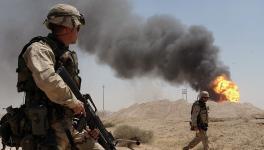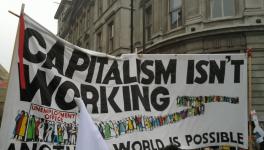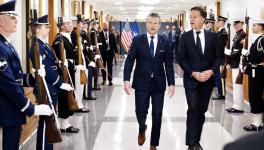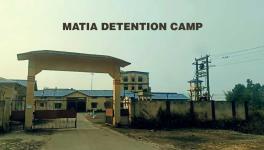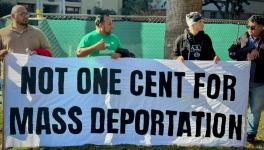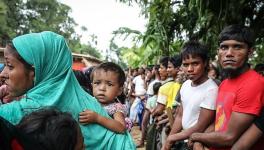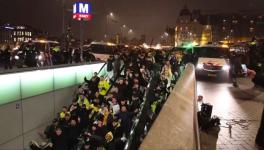Rights Activist Nandita Haksar on Seeing India through the Eyes of its Refugees
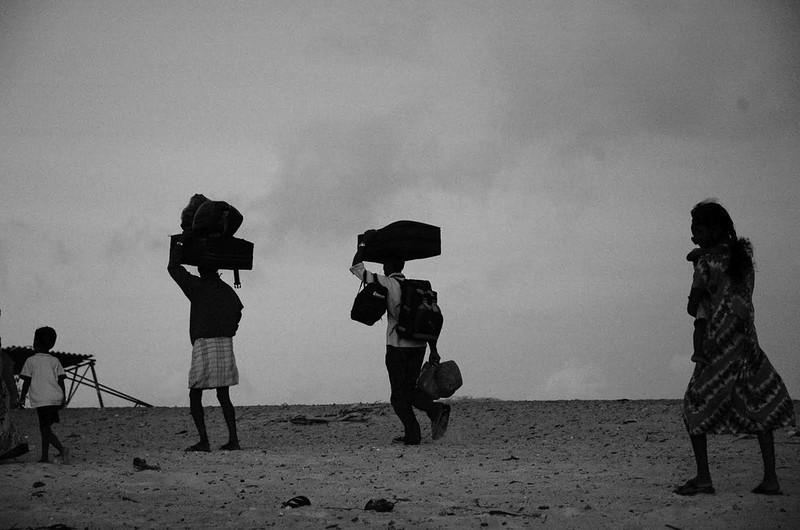
A group of Sri Lankan Tamil refugees arrives in Rameshwaram island of Tamil Nadu after a risky 30-mile boat ride across the Palk Straits.
Refugees in India do not get to speak for themselves. That is why author and human rights activist Nandita Haksar, who as a lawyer won significant court battles for refugees, has given two youngsters from Iraq their own voice in her latest book, Forgotten Refugees: Two Iraqi Brothers in India. The brothers call themselves Babil and Akkad from fear of reprisals on their family members in Iraq. They recount their anxieties in both countries through engaging stories and charming anecdotes, but the complex and troubling position of refugees in the world, and the role of the UNHCR in India, are never far from the narrative. Edited excerpts from an interview with Haksar.
You tell the story of refugees in India through the story of two Iraqi brothers, Babil and the younger one, Akkad. Why have you chosen to tell it in their words?
In India, refugees are invisible. Sometimes, the mainstream media talks about a refugee struggling to survive. But each refugee has a whole back story—who are they, what have they suffered, why are they here—none of this has ever come out. The refugees do not speak for themselves in the media. We do not see them as human beings who have each had to face multiple tragedies. For instance, I saw a person from Darfur sitting outside the UNHCR [United Nations High Commissioner for Refugees] office, who, in a very soft-spoken style told me he has seen five brothers murdered before his eyes. He said his mother and sister are still in a camp.
Back home?
Yes, I asked him, do you talk to them. He said, I do, but what has happened [to us] is so sad that we keep crying, so we just don’t talk any more. Now, if you just pass this man from Darfur by, you don’t see this story. I would have liked to see him and ask him his story and also how he sees India. He told me that in Sudan, he saw Bollywood films because of which he came to India, thinking it would be ‘full of songs and people dancing around’. He said, ‘I did not realise what I would face’.
What did he face?
As a Muslim and an African, he faced prejudice. He had no rights here. He is like an illegal alien. He could not work, which is a very precarious situation. For a person coming with tremendous trauma, of five brothers shot one by one, not to share, not to have counselling, to live with it year after year, not to have certainty… You could be put in jail, you may be deported, you have no future... It is a huge tragedy unfolding in the world and our country, so it had to be told from the point of view of refugees. Not only that they are here but their story—why they have come.
In your book, someone in Iraq says they were one of the optimists, who joined the pessimists, and ended up in exile, where they wondered if they were ‘one of the idiots’. Could you explain this?
That is a quote by a woman who called herself ‘Riverside’, a 24-year-old Iraqi woman blogger. Her accounts of Iraq were so important that a lot of people read her. She wrote that some people in Iraq—especially the young like Babil, born in 1988—were optimistic. They were not political at all and saw how oppressive Saddam Hussain’s regime had become. They had not seen or known Saddam’s previous history, but saw probably his worst side. By then, Saddam was weaponising religion to fight the American and imperialist forces. People like Babil thought Saddam has been president since 1979, so the only way to liberate themselves is if the Americans come and get rid of Saddam—as the Americans were saying. These were the optimists. They had this image of America from the media that it is free, democratic, while Iraq is tremendously oppressive. Iraq was known to be a secular country and for liberal ideas, but when these youngsters were growing up, they saw Saddam as a Sunni leader.
How did this transition happen?
In the 1970s, Iraq was one of the most modern states with the best medical system, free education, and, influenced by socialist ideas, it was one of the most progressive states in the Middle East. Americans launched a systematic attack on Arab nationalism. Arab nationalism was part of the Non Aligned Movement, but for Babil’s generation of 1988, it was just a memory. They don’t have memories of the Soviet Union, which had supported Iraq.
Then who were the pessimists?
The pessimists, who were much more political, were the older generation. They didn’t think America was just going to leave Iraq. They knew the exposés of Abu Ghraib and Chelsea Manning. But Babel didn’t know who Julian Assange or Chelsea are.
How is it possible to grow up in a country and not know what is going on, but others do, like Abu Ghraib?
Well, they knew Abu Ghraib—they used to pass by it and read the exposé, but they could not put it within a political context. They thought Americans will come, and that may be terrible, but Abu Ghraib was also a prison where Saddam was torturing people. These are just ordinary people, they are kids, and Shias, so they have already been displaced by the so-called Iraqi resistance to imperialism…
Which they see as Sunni resistance, and which, in turn, sees them as the enemy?
Which sees them as the enemy because they are Shia. There is an older history which these young people don’t know, and it is that the very strong communist party in Iraq had Shia members. They were not part of that history and grew up without that context.
Is yours a cautionary tale? From Babil and Akkad, do we learn how we ignore history in India?
The Indian middle class have taken in the whole western narrative of ‘the Soviet Union has collapsed’. Today, luckily, India and the Indian government have not supported NATO [in the Russia-Ukraine war]. But the corporate media supported NATO and joined the vilification of Russia and demonisation of [Russian President] Vladimir Putin. No Indian journalists’ association passed a resolution about the ban on Russia Today [RT though a study of RT by Manchester University shows RT is not spreading disinformation.
This reflects people forgetting and not caring to learn?
It is the way in which the west, America and Europe, have managed to control the narrative. There is a cancel culture, which is what Putin said. Why are they boycotting Russian musicians from the 19th century? Why are our musicians not passing a resolution on that? How can you “cancel” a culture, how can you ban Russian music and literature and history?
Because of the ‘war is bad’ narrative on Indian TV?
Yes, but I am not saying the war is a good thing, and for that matter, neither is Putin. Since 2014, Russia has tried to have a resolution against fascism, and the UN Assembly and west don’t allow it. Why? RT points this out—it has another viewpoint, which the west doesn’t want to hear.
Did Babil and Akkad go through something similar to what is happening in India?
Well, they say so. They say, we can see what’s happening in India is very similar to what was happening in Iraq, where every group, every person, was being made to fight with each other. Hindu-Muslim, Shia-Sunni… They don’t understand it necessarily, but they see it and they are victims of it.
So your book is also about an occupation of public views through the media.
It is, and it is about people growing up without knowing their history. When Babil and Akkad chose their names for the book, they thought of taking on a western name, “Nils”, after a character from a Swedish comic. I said, you are Iraqi refugees, coming from an ancient land, and taking a western name? They know they were Mesopotamian, they were taught in school and are proud of it. What they don’t know is how their history fits into what is happening around. Only now, after this war in Ukraine, suddenly, they became political, when they heard people say the Ukrainians are white Europeans and not Afghan or Iraqi. Those kinds of remarks made them very political.
As it was a direct attack…
On their identity, and then they were being told they are uncivilised.
What is the status of Babil and Akkad here in India?
They came to India in 2014 and are recognised UNHCR refugees. Initially, India did not recognise the UNHCR, but once it did, refugees who got its certification would go to the Foreigners Regional Registration Office (FRRO), which gave them residential permits. When I took on the first Burmese refugee cases in 1990, once they got UNHCR recognition, FRRO gave them a residential permit. With it, they opened a bank account and could work and do whatever foreigners can do legally in India. Many refugees, such as the Afghans, also got long-term visas to stay here. But suddenly, the FRRO is not giving residential permits and long-term visas. Not only the BJP government. Even before, the Indian government was denying refugees these.
When did this start?
We don’t know. ND Pancholi filed an RTI for our small organisation, Indian Friends of Refugees, asking the government since when and why refugees are not getting residential permits. The government said it cannot reply. We appealed and they said they cannot reveal this information. We are going in appeal again.
But long before 2014, refugees were prevented from staying in India?
I think the situation is complicated for many reasons. The UNHCR protects refugees but also plays a role which may not go along with India’s policy. Refugees are used in geopolitical games. That is why India—most of Asia—was not a signatory to the UN refugees convention in 1951. There is humanitarian law, and there is a politics of it. It is more complicated than it seems just by looking at the policy.
Why does India need a refugee policy?
Today, if you get a UNHCR identity card recognising you as a refugee, it gets you nowhere. The UNHCR has also stopped giving monthly stipends. So these two Iraqi brothers had no financial help except Rs. 5,000 last year. Almost no refugees got any financial assistance through Covid-19 and the lockdowns.
Though the world never saw more refugees than now.
That is why the UNHCR is not giving [financial assistance], because it has a financial strain. The West is not giving money, so UNHCR is unable to raise money. There is no transparency in how it provides and withdraws stipends. It is a horrendous situation, where refugees just get an identity card. Amazingly, Babil and Akkad did not even ask for this aid, saying they are young and can work. Akkad had a saloon in Iraq, but ISIS came and said cutting hair is haram. He was under threat there, so in India, he started cutting hair again, earning Rs. 40,000-50,000 a month. One day, the police came, called him illegal and asked for his visa. The police threw his UNHCR card in his face, beat him, and threw him out. He could not even recover his things, and there is no remedy. UNHCR says, ‘what can we do, you should not have been working’. But if you don’t work, how do you earn? Through UNHCR, the older brother, Babil, got a job as a waiter. But he says he is a graduate, why can’t he work elsewhere? Well, he is not allowed, because he does not have an Aadhaar card or residential permit. This does not make sense!
After the second coup in Myanmar, when I got the first seven from Mizzima Media, we took them to the Vikas Puri police station to say we have brought them. The police said, ‘Don’t think just because you got a court order or UNHCR card that we cannot arrest you.’
Why are they so keen to arrest?
They were trying to say that the UNHCR cannot protect them and that they were not arresting the Mizzima team from Burma, but they were arresting Rohingyas, a lot of whom were UNHCR refugees.
So there is a religious angle to how India deals with refugees?
Yes. In 1998, two Iraqis, Hazim and Anwar, stowed away from Iran to India. Their father had been executed in Iraq by Saddam, so they came to Bandar Abbas and boarded the ship ‘Vasco da Gama’, thinking it was going to Europe, but landed in Goa. In India, UNHCR asked me to handle their case and they told me that one day, in jail, the Hindu and Christian prisoners asked them why they are not celebrating Eid. Hazim said he had no idea that it was Eid that day, so the prisoners provided a prayer mat and an entirely non-Muslim congregation joined while the two prayed.
In 1998. Can you imagine such a thing happening today?
Yes—in jail they would do it, but it would not happen outside. But look, where are the refugees, Muslims, staying in India but in Hindu homes? My firm belief is that even today, ordinary people are not communal though they are being communalised. Not all two lakh refugees in India are facing prejudice. Even Babil and Akkad are not facing prejudice every day. This fact shows how systematically our people are being communalised. I emphasise: it is not true that this is us, just as it was not true that it was Iraq. I am not saying Hindu-Muslim relations were perfect in India, but for years they lived in South Asia. So why did the Partition suddenly happen in 1947? Why is everyone is fighting with everyone? Not only Hindu-Muslim, the Sikhs and Hindus are fighting, in the north-east, tribes which had lived together are fighting, castes are fighting. Why these ethnic, religious, sectarian fights suddenly? Something is happening, and it is being used. Even human rights are being used to make people fight.
You have said human rights have been weaponised.
Yes.
And the way the ‘war is bad’ theory was floated in the Indian media in the Russia-Ukraine context reflects this weaponisation?
Yes, nobody wants war, neither did Russia, but today a whole people, community, culture and people are demonised. You have to read history to understand it, but history is being wiped out because nowadays we have social media and nobody reads books.
Do you want to talk about the ‘no one is illegal’ movement in the west? Could India benefit from it?
Well, Indians could. This movement is saying how can a human being be illegal because today there are more people in the world who do not belong to a country—who are migrants, refugees or undocumented—than there are citizens. So, citizenship does not offer protection to people the way it used to. All the migrants caused by climate change, war, conflict, become people who are looked at as illegal. In India, we do not have solidarity, nor fight for rights of refugees. We have been told there are many problems, so why take on refugees?
Do they take resources away?
Most refugees are in the informal sector so they do not compete with Indians. An Iraqi restaurant does not compete with Indian restaurants. Nor do refugees compete in any major economic sector. More importantly, the west is putting the entire burden of refugees on poor countries. The largest number of refugees is in the third world. They are produced by the third world and they are in camps in the third world.
Produced by the third world?
Meaning that the west bombs our countries, say, Iraq, and nine million refugees are created, some inside Iraq, the rest in the Middle East, and very few elsewhere. Or the Syrian refugees are told to remain in Turkey, and the west will pay to keep them there. Sudanese refugees are in next-door countries. The west bombed Somalia, divided it up, and the Somalian refugees are in Kenya, itself a poor country. The west and UNHCR take a minute number of refugees. The largest number of refugees in India are not looked after by the UNHCR. Even those, they cannot—or do not—look after. Refugee protection and humanitarian law is a product of the Cold War. Their hearts were not bleeding for the refugees. It was used as a weapon against the Soviet Union and communist countries.
Why does India need a law for refugees?
In India, foreigners either come legally with a passport, visa etc., or are illegal. The latter category has illegal migrants or refugees, but the law does not distinguish the two. There is no category of foreigners either called migrants or refugees. A refugee is someone forced to leave his country because of persecution; political, social, racial, etc. He shelters in another country and wants asylum. Refugee law gives the protection that it will not deport him just because he is illegal. 99% of refugees who seek shelter elsewhere are without documents as they cannot run away with documents that would identify them as member of one community or another. Under refugee law, they come in and cannot be deported. Technically, this is the right of non-refoulement, which courts in India have recognised.
How have they recognised it?
When I did that first case in 1990, I said our Constitution gives every foreigner the right to life and a right against arbitrary procedure. Thus, non-refoulement should be read as part of the rights under Articles 14 and 21. It set the precedent, and many courts—Jammu and Kashmir, Karnataka, Maharashtra, Guwahati, Manipur—upheld right to non-refoulement. But it has not prevented the police and FRRO from deporting even refugees recognised by the UNHCR, in total violation of non-refoulement recognised by Indian courts. Refugees have been deported and arrested, suffering terrible consequences. It is like an international scandal that you recognise UNHCR, it works here, yet you deport UNHCR refugees.
What explains this situation?
I think the police are not trained on refugees and non-refoulement, the UNHCR has lawyers who don’t make enough effort and, sometimes refugees are just deported without telling UNHCR or lawyers.
Do you buy the national security argument against accepting refugees?
There is a national security angle—but what is our solution? When there is no legal framework to deal with refugees, they may seek help from someone who takes advantage of their situation. They may not even know who they are taking help from. There must be a rigorous domestic process for refugees, and we must work with UNHCR and train our people to determine who is and isn’t a refugee. Arbitrarily [excluding] a particular religion creates more national security [risks]. Look at their angst, desperation, and not being given any means of sustenance... They are human beings who need a system in which they can settle. You can define its limits, but there must be a system.
There are early discussions among various bodies for an Indian refugee law.
The UNHCR has been campaigning for a refugee law in India. A group called Ara Trust helped draft an asylum law at the instance of [Congress MP] Shashi Tharoor, which I have not studied. The NHRC has also said it wishes to draft a refugee law. At this juncture, I thought my book would make people aware of what refugees are and what protection they need. When you see two human beings—Babil and Akkad—deal with the system, it makes you aware of their problems and how the law should be drafted.
Being Muslims, and from a certain part of the world, has left Babil and Akkad somewhat disappointed with their experiences in India. The Africans, too, face horrifying racism… An African woman said her daughter was raped but she cannot go to the police because they are ‘illegal’. They were sleeping in the park as nobody gave them a house. If we look at life, or our country, through the eyes of refugees then it looks like a prison and that is not nice for us. It is a very deep dehumanisation of our country that we are not even aware of.
Get the latest reports & analysis with people's perspective on Protests, movements & deep analytical videos, discussions of the current affairs in your Telegram app. Subscribe to NewsClick's Telegram channel & get Real-Time updates on stories, as they get published on our website.










